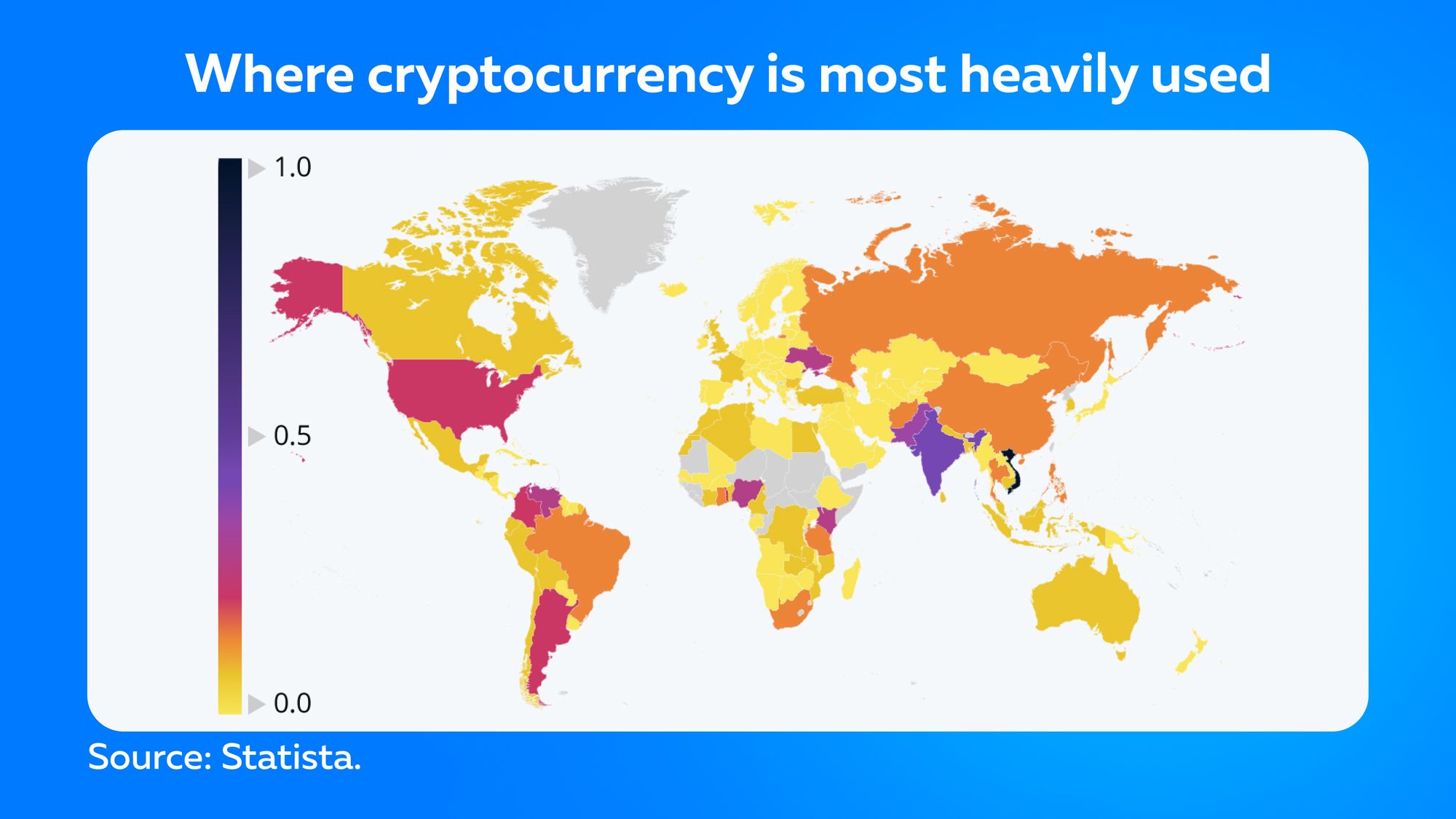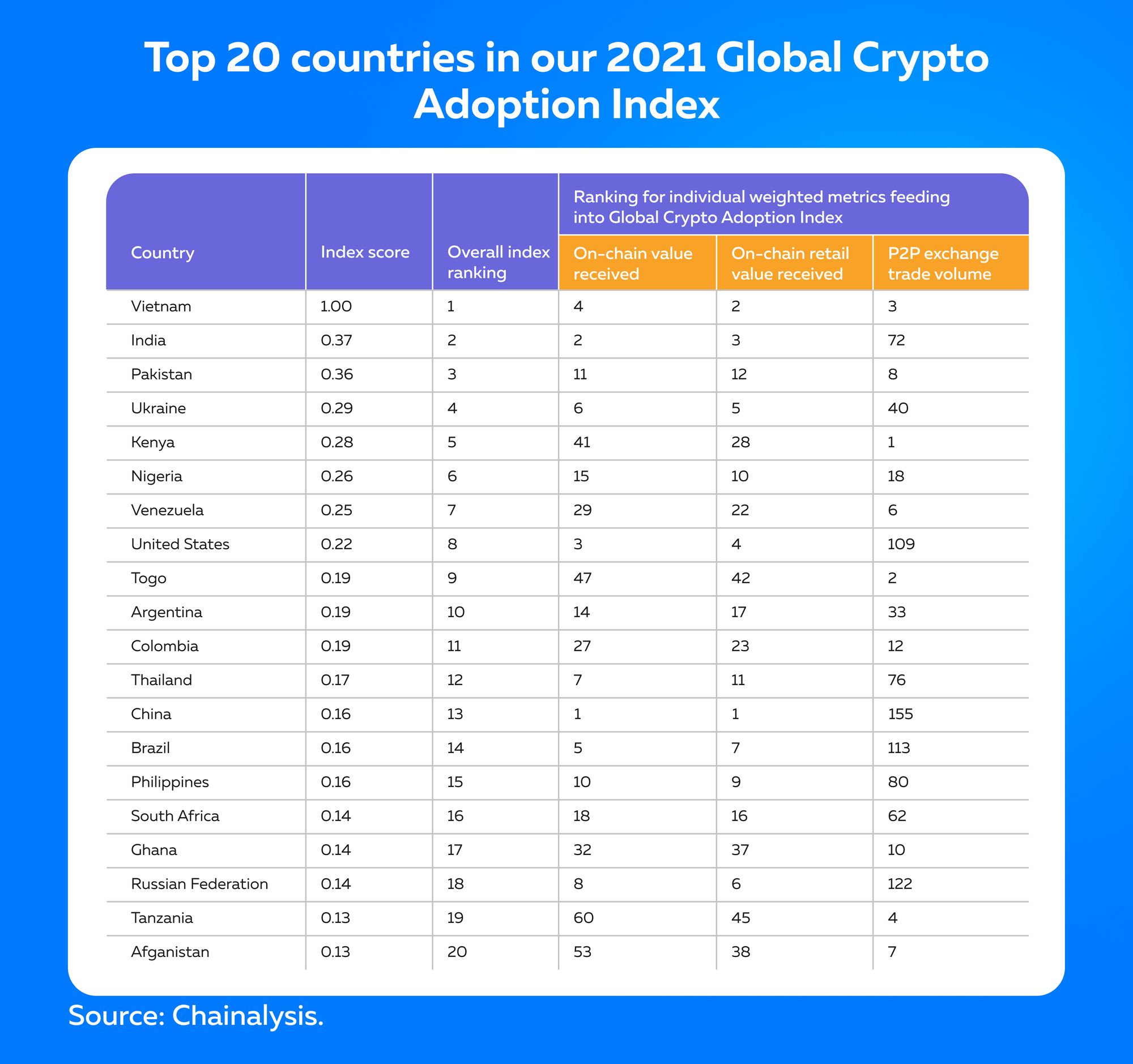Cryptocurrency is gradually gaining popularity and mainstream usage with every passing day. More countries accept technology as they understand its potential to revolutionize their business and government practices. In this article, we'll take a look at the top cryptocurrency countries in 2022 and how their economies have fared with regard to cryptocurrencies.

Cryptocurrencies are digital assets that use cryptography to secure transactions and control the creation of new units. Cryptocurrency usage began in 2009 when Bitcoin, the first cryptocurrency, was created. Since then, there has been a proliferation of cryptocurrencies, with more than 2,000 different types currently in existence. Cryptocurrencies are decentralized, meaning that they are not subject to government or financial institution control.
Crypto usage worldwide has been growing steadily over the past few years. The total value of all cryptocurrencies in circulation is now over $200 billion, with Bitcoin accounting for around 60% of this number. Cryptocurrency trading volume has also been growing steadily, with over $20 billion worth of cryptocurrencies traded daily.
Global crypto adoption
Cryptocurrency usage is not just limited to investors and speculators. They are being adopted by a growing number of businesses and organizations. Microsoft, Overstock.com, Reddit, Expedia, and Newegg are some of the big names that now accept cryptocurrencies as payment. Even governments are starting to pay attention to cryptocurrencies. The Marshall Islands has announced plans to launch its own cryptocurrency, and the Venezuelan government has launched a national crypto, the Petro.
The growing popularity of cryptocurrencies is also reflected in their increasing use as a means of investment. Cryptocurrencies are often seen as a more volatile and risky investment than traditional assets such as stocks and bonds. However, this potential for high returns has made cryptocurrencies an attractive investment for many people.
Cryptocurrency regulation around the world
The Cryptocurrency world is currently unregulated. However, this is beginning to change as governments worldwide start to take notice of cryptocurrencies and their potential impact on the world's economy. The Securities and Exchange Commission has announced plans to regulate cryptocurrencies in the US. Similarly, South Korea has set up a task force to develop cryptocurrency regulation.
Most cryptocurrencies are currently traded on decentralized exchanges, which are not subject to government regulation. However, this is changing as more centralized exchanges are beginning to list cryptocurrencies.
Some countries have already adopted a friendly cryptocurrency regulation, allowing users and investors to trade cryptocurrencies without any hassle. These countries include Malta, Japan, and Switzerland. Thus, several cryptocurrency companies take advantage of the favorable regulatory climate and relocate there. For example, one of the market leaders, Binance, had moved to Malta after being banned in China.
Top 10 Crypto Countries in 2021
The cryptocurrency market is still in the early stages of development, and its future will largely depend on government regulations. Some countries have slowly adapted to crypto, while others have taken a more open and welcoming approach. Here is a look at the top cryptocurrency countries in 2021, according to a report by Chainalysis. Countries were rated on a scale from 0 to 1. The rating considers three indicators: general crypto activity, trading activity of non-professional users, and trading volume on a P2P exchange, weighted by purchasing power parity per capita.

Vietnam
Vietnam is the indisputable leader on the list. The country has a very high number of cryptocurrency users and a large amount of crypto trading activity. Moreover, the Vietnamese government has taken a number of steps to promote cryptocurrency adoption. For example, in 2018, the country's Prime Minister, Nguyen Xuan Phuc, approved a plan to develop a legal framework for cryptocurrencies. In 2021, the country’s central bank also announced plans to launch its own Central Bank Digital Currency (CBDC).
India
India follows Vietnam. The country has over one billion people, and cryptocurrency adoption is snowballing. In 2018, the Indian government banned crypto. However, this ban was lifted in 2020, and cryptocurrency trading has resumed on several exchanges. India's cryptocurrency market is gaining in popularity. In 2021, the country's cryptocurrency trading volume increased by 400%.
Pakistan
Cryptocurrencies first arrived in Pakistan in 2012, but they only started to gain traction in 2016. The Pakistani government has taken serious steps to promote cryptocurrency adoption. In 2018, the country's central bank announced plans to launch its own cryptocurrency. Nevertheless, these plans were put on hold after the government banned cryptocurrencies in 2018. The ban was lifted in 2020, and Cryptocurrency trading has since resumed on several exchanges.
Ukraine
Ukraine is also in the top five in the use of cryptocurrency. Ukraine has the largest volume of transactions with crypto assets. Furthermore, Ukraine entered the top ten countries with the most significant earnings on bitcoins in 2020.
The Ukrainian government has used cryptocurrency to facilitate donations since the war began. After initially accepting only bitcoin and tether, they have expanded their capacity to accept over 70 forms of cryptocurrency. In 2022 Ukraine legalized cryptocurrencies which is an essential step toward developing the digital economy.
Kenya
The country is among the most innovative ones in the African continent when it comes to technology. Cryptocurrencies are no exception. Bitcoin first came to Kenya in 2013 when BTC was worth around $200. At that period, only a handful of people were using Bitcoin in the country.
But by 2017, as the price of Bitcoin started to rise, more and more people began to take an interest in cryptocurrencies. By 2018, there were around 50,000 Bitcoin users in Kenya. The Kenyan government has also taken steps to promote cryptocurrency adoption. In 2019, the country’s central bank announced plans to launch its own Central Bank Digital Currency (CBDC).
Nigeria
Nigeria is among the most populous countries in Africa, with a population of over 200 million people. Crypto came to Nigeria in 2015, when the country’s first Bitcoin exchange, NairaEx, was launched. Since then, cryptocurrency adoption has grown rapidly.
In 2020, the Nigerian government also announced plans to launch its own Central Bank Digital Currency (CBDC).
Venezuela
The country is located in South America and has a population of over 30 million people. The Venezuelan economy has been in decline in recent years due to political instability. The Venezuelan government has responded to the economic crisis by launching a national cryptocurrency, the Petro. The Petro is intended to be used as a means of payment and will be backed by the country's oil, gas, gold, and diamond reserves. Since the launch of its own crypto, the usage of this currency has been overgrown in Venezuela. In 2020, the Venezuelan government also launched a cryptocurrency debit card, which can be used to spend cryptocurrencies at businesses that accept the card.
The United States
The United States is the largest economy in the world, with a population of over 327 million people. Cryptocurrencies have been gaining popularity in the US in recent years. The US Securities and Exchange Commission has begun to regulate cryptocurrency, and major businesses have started accepting them as payment.
Togo
It is a small West African country with just over eight million population. Cryptocurrencies first came to Togo in 2017, when the country's first Bitcoin exchange, Togobit, was launched. Since then, cryptocurrency adoption has been growing slowly but steadily. In 2020, the Togolese government announced plans to launch its own Central Bank Digital Currency (CBDC).
Argentina
Argentina is a South American country that has a population of over 45 million people. Cryptocurrencies have been gaining popularity in Argentina in recent years. Cryptocurrency usage in Argentina has been snowballing in recent years. In 2019, the number of Bitcoin users in Argentina increased by 20%. The Argentine government has also taken steps to promote cryptocurrency adoption. In 2020, the country's central bank announced plans to launch its own Central Bank Digital Currency (CBDC).
Conclusion
The use of cryptocurrency is becoming more widespread and accepted. Cryptocurrency usage is proliferating all over the world. Businesses, governments, and individuals are adopting cryptocurrencies.
Cryptocurrency adoption is driven by several factors, such as economic instability, political instability, and the desire for an alternative to traditional fiat currencies. We can expect to see cryptocurrencies become more popular and widely used in the future.
